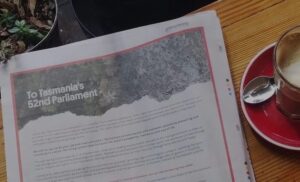Tasmania’s coastal waters are in trouble and Tasmanians know it. Recently published research in the journal Nature, the world’s leading science journal, found that more than 500 common species of marine life have declined around Australia in the past decade. These declines are most marked in the rocky kelp-dominated reefs around Tasmania.
We know that Tasmania’s east coast is a climate change hotspot and sea temperatures are rising four times faster than elsewhere worldwide. The scientists explain that coastal development, catchment degradation, pollution and fishing are also having impacts.
So, it should come as no surprise to the Tasmanian Government that Tasmanians are concerned about the health of our coast, as recently released Australia Institute research has found.
The Australia Institute’s survey asked Tasmanians a range of question about the health of our coast, and shows that three quarters (76%) of Tasmanians are concerned about the health of our coastal environment, while seven in ten (72.1%) back a reduction in inshore salmon farming, among other findings.
Momentum is building around the state as communities in the north-west and north-east express their opposition to any new salmon farms in their blue backyards. They have seen what is happening to sheltered inshore waters in the south-east and they don’t want it to happen to their ocean.
This research shows that when it comes to protecting Tasmania’s coast, public opinion and scientific evidence are on one side, and the vested interests of industry is on the other. Tasmanians want the Government to listen to the evidence and support the recommendation from the Parliamentary Inquiry to reduce industrial salmon farming so close to our coast and ocean communities.
The message from this research is clear: public opinion backs the science – an overwhelming number of Tasmanians support what the evidence is telling us we need to do.
There are three things the Government can take action on, as it reviews its marine regulations.
Firstly, it should implement the Parliamentary Inquiry’s recommendations in full, in line with science and public opinion.
Secondly, the Government needs go back to the drawing board with its plans for expanding the salmon industry and come up with a real plan, with meaningful environmental standards. Vague one-liners and changing the rules to suit the industry are unacceptable ways to manage our oceans.
Thirdly, and more broadly, we need a bigger conversation about marine management because Tasmania’s oceans are worth more to all of us than just meeting the needs of big salmon companies.
Despite most (59.3%) people being unaware just how bad the situation is for some of Tasmania’s most popular fish stocks (IMAS identified high fishing pressure is a concern for 6 species in 2022), almost half of Tasmanians surveyed (49.8%) are not confident that State Government’s current law reforms will do enough to protect the health of Tasmania’s coastal waters.
It is clear that Tasmanians want to protect their marine life, but the government should take seriously the fact that Tasmanians appear to have lost faith in this government to undertake meaningful reform to protect the environment.
Eloise Carr is Director of the Australia Institute Tasmania. @GeneveraE
Related research
Between the Lines Newsletter
The biggest stories and the best analysis from the team at the Australia Institute, delivered to your inbox every fortnight.
You might also like
Open Letter to the Tasmanian Government
The Australia Institute and 30 other organisations from around Tasmania have published an open letter with 10 asks for the environment from whomever forms Tasmania’s next government. When cross-benchers and major parties have struck successful power-sharing agreements elsewhere, they covered policy as well as procedure, making now the ideal time for progress.
One year on from the State of the Environment Report, what’s changed?
(Spoiler alert: nothing!)
Are Australians eating diseased salmon? Sickening new revelations from Tasmania
Shocking new revelations about Tasmanian salmon should leave all Australians feeling sick to the stomach.


